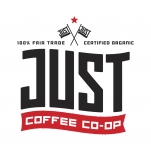

Just Coffee Cooperative

Wisconsin, United States
September 2017
Agricultural Processing
Agriculture/Growers
United States
Just Coffee, founded in 2001, developed out of a project with Mayan Zapatista coffee farmers in Chiapas, Mexico. The original LLC re-organized as a worker cooperative in 2006. Just Coffee’s operating principal from the start was to demonstrate a model of fair trade that distributes the proceeds of production as equitably as possible along the supply chain, providing the raw-materials producers at the beginning of that chain a better return than under the existing fair-trade regime, while also setting a standard for transparency in the coffee industry. In pursuit of these goals, the cooperative has always purchased green coffee exclusively from grower coops, via a cooperative importer, and continues to make a priority of purveying through cooperative groceries, though the Madison-based roastery also distributes to large grocery chains, smaller independent stores and cafes, as well as online. Their current contracts with farmers, including the price paid per pound, are always publicly available online. Just Coffee currently works with 15 grower coops in Latin America, Asia, and Africa, though it continues to re-tool its product-line to reduce as far as possible the travel distance / carbon footprint of its raw material. Although the pandemic has reduced direct contact with prod
Overall B Impact Score
Governance 11.5
Governance evaluates a company's overall mission, engagement around its social/environmental impact, ethics, and transparency. This section also evaluates the ability of a company to protect their mission and formally consider stakeholders in decision making through their corporate structure (e.g. benefit corporation) or corporate governing documents.
What is this? A company with an Impact Business Model is intentionally designed to create a specific positive outcome for one of its stakeholders - such as workers, community, environment, or customers.
Workers 10.8
Workers evaluates a company’s contributions to its employees’ financial security, health & safety, wellness, career development, and engagement & satisfaction. In addition, this section recognizes business models designed to benefit workers, such as companies that are at least 40% owned by non-executive employees and those that have workforce development programs to support individuals with barriers to employment.
Community 46.1
Community evaluates a company’s engagement with and impact on the communities in which it operates, hires from, and sources from. Topics include diversity, equity & inclusion, economic impact, civic engagement, charitable giving, and supply chain management. In addition, this section recognizes business models that are designed to address specific community-oriented problems, such as poverty alleviation through fair trade sourcing or distribution via microenterprises, producer cooperative models, locally focused economic development, and formal charitable giving commitments.
What is this? A company with an Impact Business Model is intentionally designed to create a specific positive outcome for one of its stakeholders - such as workers, community, environment, or customers.
Environment 31.0
Environment evaluates a company’s overall environmental management practices as well as its impact on the air, climate, water, land, and biodiversity. This includes the direct impact of a company’s operations and, when applicable its supply chain and distribution channels. This section also recognizes companies with environmentally innovative production processes and those that sell products or services that have a positive environmental impact. Some examples might include products and services that create renewable energy, reduce consumption or waste, conserve land or wildlife, provide less toxic alternatives to the market, or educate people about environmental problems.
What is this? A company with an Impact Business Model is intentionally designed to create a specific positive outcome for one of its stakeholders - such as workers, community, environment, or customers.
Customers 2.7
Customers evaluates a company’s stewardship of its customers through the quality of its products and services, ethical marketing, data privacy and security, and feedback channels. In addition, this section recognizes products or services that are designed to address a particular social problem for or through its customers, such as health or educational products, arts & media products, serving underserved customers/clients, and services that improve the social impact of other businesses or organizations.